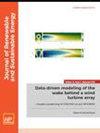Study on the electricity spot market trading mechanism considering the proportion of renewable energy consumption quota
IF 1.9
4区 工程技术
Q4 ENERGY & FUELS
引用次数: 0
Abstract
The challenge of harmonizing the integration of renewable energy in market-driven transactions and assured accommodations presents a predicament in the development of China's electricity spot market. Moreover, as renewable energy penetration escalates, the issue of reserve undeliverability due to transmission congestion diminishes the power system's capacity to utilize renewable energy resources. To address this concern, this study introduces a secondary clearing mechanism for the electricity spot market, taking into account the proportion of renewable energy consumption quotas. Based on the first clearing, when renewable curtailment occurs, the bid pricing of abandoned power units undergoes flexible adjustment through the optimization of the price correction coefficient, followed by the execution of a secondary clearing utilizing the revised bidding information to fulfill the stipulations of the renewable energy consumption quota ratio. Drawing on the outcomes of the two-stage clearing, an incentive-compatible settlement compensation mechanism is proposed to preserve the impartiality of the market operator. The spot market clearing model accounts for the transmission safety margin, effectively mitigating the likelihood of transmission congestion, reserve inaccessibility, and renewable energy curtailment issues in real-time dispatching. Finally, a modified IEEE 30-bus system serves to substantiate the efficacy of the proposed market mechanism.考虑可再生能源消费配额比例的电力现货市场交易机制研究
如何协调可再生能源在市场驱动的交易和有保障的住宿中的整合,是中国电力现货市场发展中的一个难题。此外,随着可再生能源普及率的提高,由于输电拥塞导致的储备不可交付问题降低了电力系统利用可再生能源的能力。为了解决这一问题,本研究引入了电力现货市场的二级清算机制,并考虑了可再生能源消费配额的比例。在第一次清盘的基础上,当可再生能源弃电发生时,通过价格修正系数的优化,对弃电机组投标价格进行灵活调整,然后利用修改后的投标信息进行二次清盘,以满足可再生能源消纳配额比例的规定。根据两阶段结算的结果,提出了一种激励相容的结算补偿机制,以保持市场经营者的公正性。现货市场结算模式考虑了输电安全余量,有效缓解了实时调度中出现输电拥塞、备用不可达、可再生能源弃电等问题的可能性。最后,一个改进的IEEE 30总线系统用于证实所提出的市场机制的有效性。
本文章由计算机程序翻译,如有差异,请以英文原文为准。
求助全文
约1分钟内获得全文
求助全文
来源期刊

Journal of Renewable and Sustainable Energy
ENERGY & FUELS-ENERGY & FUELS
CiteScore
4.30
自引率
12.00%
发文量
122
审稿时长
4.2 months
期刊介绍:
The Journal of Renewable and Sustainable Energy (JRSE) is an interdisciplinary, peer-reviewed journal covering all areas of renewable and sustainable energy relevant to the physical science and engineering communities. The interdisciplinary approach of the publication ensures that the editors draw from researchers worldwide in a diverse range of fields.
Topics covered include:
Renewable energy economics and policy
Renewable energy resource assessment
Solar energy: photovoltaics, solar thermal energy, solar energy for fuels
Wind energy: wind farms, rotors and blades, on- and offshore wind conditions, aerodynamics, fluid dynamics
Bioenergy: biofuels, biomass conversion, artificial photosynthesis
Distributed energy generation: rooftop PV, distributed fuel cells, distributed wind, micro-hydrogen power generation
Power distribution & systems modeling: power electronics and controls, smart grid
Energy efficient buildings: smart windows, PV, wind, power management
Energy conversion: flexoelectric, piezoelectric, thermoelectric, other technologies
Energy storage: batteries, supercapacitors, hydrogen storage, other fuels
Fuel cells: proton exchange membrane cells, solid oxide cells, hybrid fuel cells, other
Marine and hydroelectric energy: dams, tides, waves, other
Transportation: alternative vehicle technologies, plug-in technologies, other
Geothermal energy
 求助内容:
求助内容: 应助结果提醒方式:
应助结果提醒方式:


